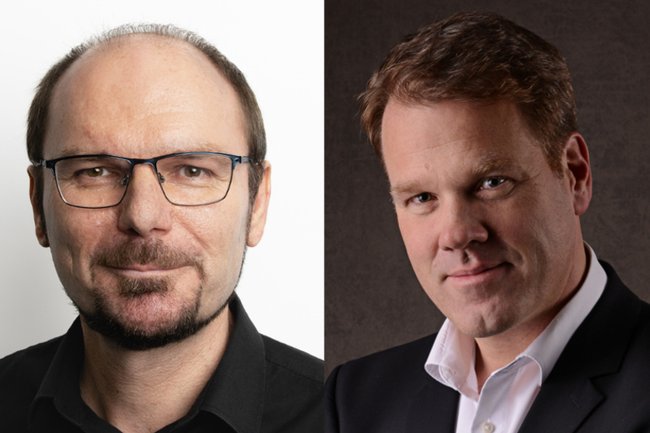Future Work Skills: Preparation – but What for?
A Double Interview with Josef Weißenböck from the St. Pölten UAS and Ulf-Daniel Ehlers from Baden-Wuerttemberg Cooperative State University (DHBW)
Everyone is talking about “Future Work Skills”: what does this even mean?
Ulf-Daniel Ehlers: Since the 1980s, there have been discussions about whether the educational offer of universities is still in line with the current job requirements. In the research sector, there was talk about “gradual attributes”, “key competencies” and “21st-century skills” – what we refer to as Future Work Skills today.
As we can see, this discussion is not new. It has to be said, however, that the call for Future Work Skills is growing louder and louder against the background of social changes in an increasingly digitalised world. The question is: how do people prepare for the future job market if we don’t know what it will be like? We have defined 17 different profiles for Future Work Skills that are divided into three areas: subjective, objective, and organisational or social skills. Examples include self-management, agility in terms of the social and organisational environment, and the ability to cooperate.
Josef Weißenböck: The traditional model of clearly delineated professional fields that we design curricula for is going to become obsolete in the next couple of years. In the current development of curricula at the St. Pölten UAS, I have noticed that the topic of Future Work Skills is very present in the minds of the key players and is strongly integrated into our activities, especially through our cooperation partners from the industry. Until only a few years ago, we experts of university didactics were the driving force behind this development.
Don’t get me wrong: specialist competence will continue to be important! But the professional success of university graduates will increasingly depend on Future Work Skills. Incidentally, these skills are already required in our environment and in the sectors for which the students of the St. Pölten UAS are trained. We should therefore refer to them as “Contemporary Work Skills” instead.
Does the discussion use too many keywords? Is the hype surrounding Future Work Skills justified?
Ehlers: Keywords are always used when it comes to discussing educational systems. Most of them are not clearly defined terms but generic trademarks and bundles of concepts. This is true for Future Work Skills as well. For various reasons, more and more importance is attached to education, which is why the discussion about how education should be conceptualised is also crucial: how can we offer possibilities for social participation to as many people as possible?
Weißenböck: As regards the hype, I would like to point out that it is good scientific practice to critically question every hype. Looking more closely at the terms, it becomes clear that all of them point in a similar direction. Three years ago, we hosted a “Tag der Lehre” (Day of Teaching) on the topic of “deeper learning” at the St. Pölten UAS and deliberately added the term “sustainable learning”.
We contrasted this approach with the standard practices of university didactics where it is still common to learn content by heart for examinations in the short term. This has to be critically questioned. How can we create sustainable teaching models? How do we reinforce problem-based approaches? How can intercultural competence be strengthened? How do we accommodate all this with the digitalisation?
What is the relationship between deeper learning / sustainable learning and Future Work Skills?
Weißenböck: We have developed the interdisciplinary project semester iLab at the St. Pölten UAS. This is our flagship project with which we make an effort to put deeper learning into practice. In the iLab, teams made up of local students and incoming students from all over the world work on practical and interdisciplinary problems together. The working language is English. In 2019, the iLab won the Ars Docendi State Prize for Excellence in Teaching.
Ehlers: We have a “Next Skills Initiative“ that deals with changes in university teaching. This refers to didactic and structural changes in the direction of deeper learning, personalised learning, individualised learning paths, and other innovative teaching and learning models.
The coronavirus crisis has made major adjustments in the higher education sector necessary.
How will our ways of teaching and learning be changed by the crisis?
Ehlers: Changes towards Future Skills actually require a different approach. So far, the universities have reflexively created additional institutions. When we need key qualifications, we launch centres for key qualifications – and of course, it’s not bad to have something like this.
In future, however, it will be important to make changes within the curricula. This cannot be done overnight, it has to be a cultural development. The most important thing is to develop a concrete target vision in order to know which direction to pursue.
Weißenböck: In all seriousness, though: nobody can know this. However, what is already becoming visible is an important impetus in our digitalisation strategy. We focus on how quality can be promoted in distance learning as well.
We all know what it is like: after several weeks in online mode, the novelty often wears off and it is hard to live up to the students’ expectations. This is where the service unit SKILL comes in to offer support for further development. I believe that the current crisis has definitely been accompanied by inspiring impulses for our learning culture and digital learning pathways.
Josef Weißenböck heads the service unit SKILL (Service and Competence Center for Innovative Teaching and Learning) at the St. Pölten UAS.
Ulf-Daniel Ehlers is a professor of education management and lifelong learning at Baden-Wuerttemberg Cooperative State University (DHBW).
Interview: Jakob Leissing (St. Pölten UAS).
